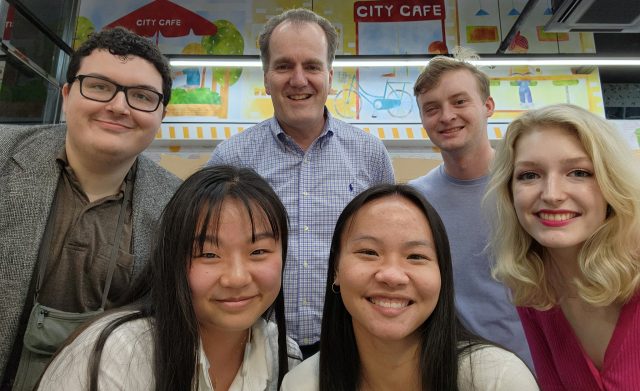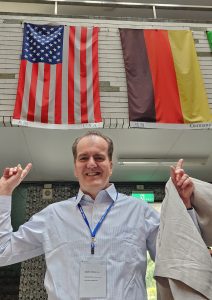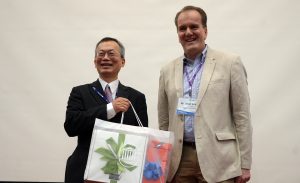
Oliver Dinius (top center), executive director of the Croft Institute for International Studies, meets with Ole Miss students studying abroad in Taiwan. Dinius invited the students to dinner while he visited Taipei in March on a Fulbright International Education Administrator Award trip. Submitted photo
OXFORD, Miss. – While visiting colleges in Taiwan in March as a part of a Fulbright International Education Administrator Award, Oliver Dinius received an email saying he had received another Fulbright award.
Dinius’ trip to Taiwan was part of a 2020-21 grant that was twice delayed due to COVID-19 travel restrictions. While abroad, the executive director of the University of Mississippi‘s Croft Institute for International Studies learned that he was chosen for a 2023-24 Fulbright Scholar Award, which will send the historian to Brazil to study development policies in the Amazon region.
“Being awarded this Fulbright Award opens up new opportunities,” Dinius said. “I was doubly fortunate to have the privilege of being chosen twice in very close succession for very different awards.”
Receiving two Fulbright Awards in less than five years is incredibly rare, said Douglass Sullivan-González, a UM professor of history and former dean of the Sally McDonnell Barksdale Honors College who wrote a letter of recommendation for Dinius’ latest Fulbright.
“Dr. Dinius’ success enables us to nudge our academic structure to accommodate programmatic inquiry into these regions,” Sullivan-González said. “That kind of stellar recognition allows him to become an influencer in what’s happening on campus.”

Oliver Dinius, executive director of the Croft Institute for International Studies, poses with American and German flags at the Fu Jen International Student Office at Fu Jen Catholic University in Taiwan. Dinius, who grew up in Germany, used his 2020-21 Fulbright IEA award to visit universities that could become study abroad locations for Ole Miss students. Submitted photo
With the completion of his trip to Taiwan, Dinius has studied in, lived in or traveled to each of the four primary regions the Croft Institute focuses on: Latin America, East Asia, Europe and the Middle East.
“For me, it was the one region on that list that I had never been to,” he said. “I always felt that there was something missing in my knowledge base as director of the Croft Institute.
“It was a lack of familiarity with a crucial part of the program, namely some sense of what it was like for students to go to east Asia and explore its opportunities.”
Dinius’ travel to Taiwan allowed him to visit many colleges in the capital city of Taipei, which is becoming the new hub for Chinese-language learning students at Ole Miss, as well as in other parts of the island.
Before the COVID-19 pandemic, UM students had frequently traveled to and studied in mainland China. With the pandemic – and travel restrictions – many students needed a new place to hone their language expertise and fulfill the study abroad requirement for the Croft Institute.
“With COVID in the recent background, we were trying to figure out, ‘What are good options for our students?'” he said. “Taiwan was a new option, and I wanted to see whether these programs in Taiwan identified by my colleagues in the Chinese Flagship Program would be good sites for Croft’s purposes as well.”
Dinius said he also hopes to integrate Taiwan into the Croft Institute’s UM Experiential Learning in Eastern Asia, an internship program funded by the Freeman Foundation that gives students a taste of working in eastern Asia for eight weeks.
The Fulbright IEA award afforded Dinius greater knowledge to counsel students planning to spend time abroad in East Asia, and Taiwan in particular, he said.
“I think it’s beneficial if you have someone who can tell you and maybe reassure you in my role, ‘Look it’s going to be different, but you’re going to be able to manage it,'” he said.
“For me, studying abroad and completing an internship abroad is really about getting used to a different environment and making things work for yourself in that environment. If everything seems familiar, what’s the point?”

Oliver Dinius (right) presents a gift from Mississippi to Tsai-Yen Li, president of the National Chengchi University in Taipei, Taiwan. Submitted photo
While the Fulbright IEA Award was focused on new places, the Fulbright Scholar Award is, for Dinius, a return to his favored area of study. The German native has made a career of studying the economy and development of modern Latin America, particularly Brazil.
For two months this fall and two months in spring 2024, Dinius will live in Belém, Pará, to study how development projects in the Amazon rainforest have fared, what impact they have had on residents and what the ramifications are for the world’s environment.
These research efforts are in service to a book that is nearly 10 years in the making, he said.
“What I’m trying to do in these four months’ stay is to talk to academics and practitioners on the ground, trying to understand how they see what’s been happening in the last 20 years, a time of rapid change,” he said.
Unlike most historical scholarship, Dinius’ research focuses not just on the past, but on the ways the past influences our present and future, he said. The Amazon rainforest, known as the world’s carbon sink, has made international news consistently over the last few decades as advocators of development clash with those who vie for conservation and against deforestation, he said.
“It’s not pure history, even though it’s very much informed by a historian’s way of formulating questions,” Dinius said.
“How has development policy shaped the Amazon we see today? What is the Amazon’s role in managing the global climate crisis? How can needs of the local population and responding to a global challenge be reconciled?”